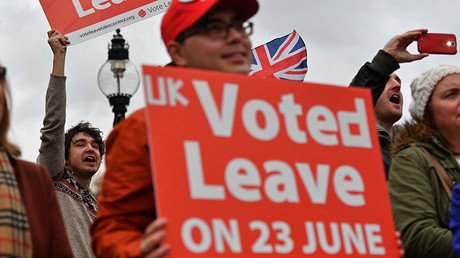Brexit legal challenge: Theresa May appeals Article 50 ruling in Supreme Court
Prime Minister Theresa May’s government launched its Supreme Court appeal on Monday to overturn an earlier High Court ruling, which stated Article 50 of the Lisbon Treaty could only be triggered with the input of Parliament.
The most powerful court in the land is being asked to overturn a recent High Court decision that ruled it unconstitutional for May to formally trigger the process of leaving the EU without first consulting MPs.
Brexiteers have seen the High Court ruling as an affront to democracy and an attempt to overturn the referendum result of June 24.
Monday’s session sees the beginning of the final legal battle over the Brexit process. Eleven Supreme Court justices are hearing the arguments for and against May’s royal prerogative powers over Brexit decisions.
If the government’s bid is unsuccessful, Brexit Secretary David Davis and his team of lawyers would have to take the case to Luxembourg’s European Court of Justice. Failing that, Britain’s withdrawal from the EU would face unknown complications and certain delays.
Leave campaigners assembled outside the Houses of Parliament to protest the justices’ right to decide on the fate of future Brexit negotiations.
“The country voted to leave the European Union in a referendum provided for by an Act of Parliament,” Attorney General Jeremy Wright QC MP said.
“The government is determined to respect the result of the referendum. The government’s case is that it does have legal power to trigger Article 50 on the timetable set out by the prime minister. We do not believe another Act of Parliament is necessary.”
Proceedings don't start until 11am but it's all kicked off early outside the Supreme Court... pic.twitter.com/0g3NnjCKLU
— Theo Usherwood (@theousherwood) December 5, 2016
In a paper submitted to the lord justices, he said the Supreme Court would “stray into areas of political judgment rather than legal adjudication” if it were to rule against the government.
“The premise of the 2015 [referendum] act was the continued existence of the government’s prerogative powers to act on the international plane – including, specifically, to give Article 50 notice as the first step to implementing a ‘leave’ vote. That was the clear understanding of all concerned and the basis on which people voted in the referendum.”
In his submission, the attorney general also gave an example of how the decision to let Parliament vote on the terms and conditions of Brexit would be calamitous for the entire project.
“Suppose that the government wished in the negotiations to preserve for UK citizens one part of EU law rights but not another part,” he wrote. “That position could have a direct impact on the continued enjoyment of current statutory rights.
“On the Court’s analysis, the government could not adopt that position and reach agreement on that basis without specific approval in an act of parliament. Parliament would be put in the position of ‘micromanaging’ treaty negotiations.”
Earlier on Monday, Shadow Attorney General for England and Wales Shami Chakrabarti told BBC Radio 4 Today program the High Court decision was not against the will of the people, but rather abiding to the constitution.
“We have been completely clear that we are democrats and respect the outcome of the referendum, even though many of us – myself included – campaigned in the opposite direction,” she said.
“So this will happen, pursuant to the will of the people. But there is not a simple question of ‘in and out of the European Union,’ there are many questions that Parliament has to scrutinize about what happens next.”
She also defended the Supreme Court judges, whose treatment by some members of the press she believed to have been “verging on vilification.” Some mainstream newspapers, including the Daily Mail, have taken their scrutiny of the 11 justices to the point of publishing anti-Brexit tweets by their relatives.
“The judges are not fair game,” Chakrabarti told Today presenter Nick Robinson.
“They cannot speak up for themselves and we all need them in the end if we are going to settle our disputes in a civilized way in the courtroom.
“As a matter of law, our overarching constitutional principle in this country – one indeed that many Brexiteers wanted to champion – is the principle of parliamentary sovereignty.
“The fact that the people have spoken via a referendum means that the people have spoken to Parliament.”
If the government wins its appeal, Theresa May has the green light to invoke Article 50 in March 2017 and start the two-year EU exiting process, as planned.













